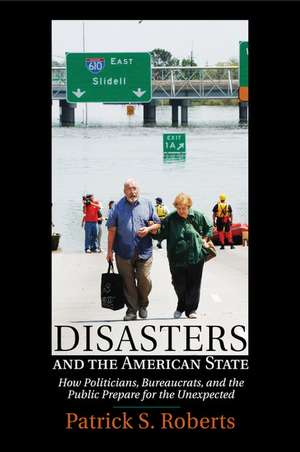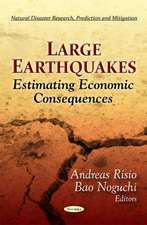Disasters and the American State: How Politicians, Bureaucrats, and the Public Prepare for the Unexpected
Autor Patrick S. Robertsen Limba Engleză Paperback – 5 oct 2016
| Toate formatele și edițiile | Preț | Express |
|---|---|---|
| Paperback (1) | 283.41 lei 6-8 săpt. | |
| Cambridge University Press – 5 oct 2016 | 283.41 lei 6-8 săpt. | |
| Hardback (1) | 716.89 lei 6-8 săpt. | |
| Cambridge University Press – 27 oct 2013 | 716.89 lei 6-8 săpt. |
Preț: 283.41 lei
Nou
Puncte Express: 425
Preț estimativ în valută:
54.24€ • 58.89$ • 45.56£
54.24€ • 58.89$ • 45.56£
Carte tipărită la comandă
Livrare economică 22 aprilie-06 mai
Preluare comenzi: 021 569.72.76
Specificații
ISBN-13: 9781316631201
ISBN-10: 1316631206
Pagini: 236
Ilustrații: 17 b/w illus.
Dimensiuni: 153 x 230 x 15 mm
Greutate: 0.35 kg
Editura: Cambridge University Press
Colecția Cambridge University Press
Locul publicării:New York, United States
ISBN-10: 1316631206
Pagini: 236
Ilustrații: 17 b/w illus.
Dimensiuni: 153 x 230 x 15 mm
Greutate: 0.35 kg
Editura: Cambridge University Press
Colecția Cambridge University Press
Locul publicării:New York, United States
Cuprins
1. From disaster relief to disaster management; 2. The origins of the disaster state, 1789–1914; 3. Civil defense and the foundations of disaster policy, 1914–79; 4. The rise of emergency management and FEMA, 1979–2001; 5. Terrorism and the creation of the Department of Homeland Security, 1993–2003; 6. 'Where the hell is the Army?' Hurricane Katrina meets the homeland security era; 7. Administrative evil and elite panic in disaster management; 8. Disasters and the American state.
Recenzii
'[Roberts] has immersed himself with admirable thoroughness in the tangled story of how the federal government came to be the lead actor when disaster strikes. Above all, he develops a thoroughly persuasive historical and institutional explanation for how FEMA came to be a byword for bureaucratic incompetence - first, at the turn of the 1990s, then, more spectacularly, in the aftermath of Hurricane Katrina.' Gareth Davies, The Forum
'Roberts' balanced handling of the much misunderstood response to Katrina is magisterial … This is not only a powerfully argued, relentlessly fair account of the troubles that plague the federal management of disaster, but also an edifying comment on the limits any modern democracy faces in acting swiftly and effectively.' Kirkus Reviews
'… a thoroughly persuasive account of the long and uneven development of what he calls the American 'disaster state'. Roberts' fundamental goal is to help us understand contemporary disaster politics, including how past politics and institutions have given rise to these politics. He draws on insights from the literature on American political development to provide us with this account, which emphasizes the role of historical patterns as well as idiosyncrasies in creating these politics, and their roles in shaping the American state. The book is very well written, provocative, and well researched. Anyone interested in American political development should find it compelling, and of course, disaster scholars may be especially interested.' Logan Strother, Disaster, Property and Politics blog (disasterspropertypolitics.com)
'Roberts' balanced handling of the much misunderstood response to Katrina is magisterial … This is not only a powerfully argued, relentlessly fair account of the troubles that plague the federal management of disaster, but also an edifying comment on the limits any modern democracy faces in acting swiftly and effectively.' Kirkus Reviews
'… a thoroughly persuasive account of the long and uneven development of what he calls the American 'disaster state'. Roberts' fundamental goal is to help us understand contemporary disaster politics, including how past politics and institutions have given rise to these politics. He draws on insights from the literature on American political development to provide us with this account, which emphasizes the role of historical patterns as well as idiosyncrasies in creating these politics, and their roles in shaping the American state. The book is very well written, provocative, and well researched. Anyone interested in American political development should find it compelling, and of course, disaster scholars may be especially interested.' Logan Strother, Disaster, Property and Politics blog (disasterspropertypolitics.com)
Notă biografică
Descriere
Disasters and the American State offers a thesis about the trajectory of federal government involvement in preparing for disaster shaped by contingent events.













